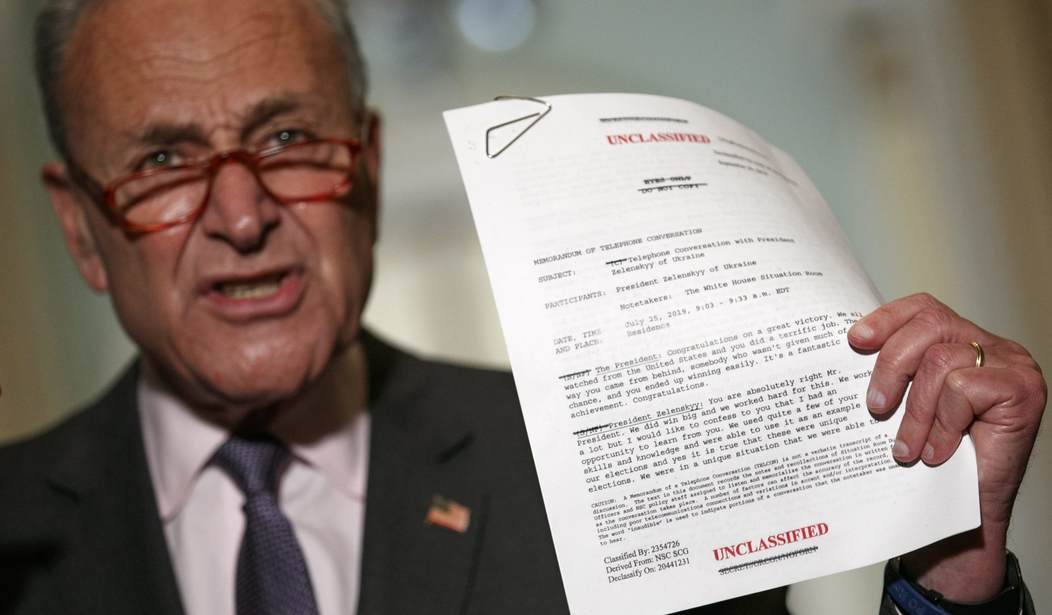Those who have been receiving the news about the whistleblower allegations against President Trump with skepticism rather than glee have mostly focused on the rather tenuous second-hand knowledge nature of the claims. It appears that, until recently, those claims wouldn’t have been allowed in a whistleblower complaint:
BREAKING: The intelligence community secretly eliminated a requirement that whistleblower complaints contain only direct, first-hand knowledge of wrongdoing allegations.
A new version of the complaint form allowing hearsay was secretly revised last month. https://t.co/ZvCpCMBx8h
— Sean Davis (@seanmdav) September 27, 2019
This may actually be a bigger bombshell than the report itself.
Between May 2018 and August 2019, the intelligence community secretly eliminated a requirement that whistleblowers provide direct, first-hand knowledge of alleged wrongdoings. This raises questions about the intelligence community’s behavior regarding the August submission of a whistleblower complaint against President Donald Trump. The new complaint document no longer requires potential whistleblowers who wish to have their concerns expedited to Congress to have direct, first-hand knowledge of the alleged wrongdoing that they are reporting.
The brand new version of the whistleblower complaint form, which was not made public until after the transcript of Trump’s July 25 phone call with the Ukrainian president Volodymyr Zelensky and the complaint addressed to Congress were made public, eliminates the first-hand knowledge requirement and allows employees to file whistleblower complaints even if they have zero direct knowledge of underlying evidence and only “heard about [wrongdoing] from others.”
This none-too-subtle morphing of actual whistleblowing into rumor spreading has “slippery slope” written all over it. It’s another one of those political daggers that seems like a good idea as long as it is being used against one’s opponents. Little thought is given by those first employing the tactic about the day when it may be used against them.
Political journalism in the Trump era has been defined by weak, anonymous sourcing and “reporting” that requires a thesaurus-full of qualifying words. That’s dangerous enough in the hands of the press, and is even creepier if used as in-house political attack tools.
Here are some examples of what I’m talking about from a recent article about the complaint in The Hill.
The article purports to examine the “most serious charges” from the complaint. Here is how The Hill presents what is considered to be the most serious of the bunch:
The big revelation in the whistleblower’s complaint is the suggestion that the White House sought to hide the word-for-word transcript of the call.
This move was allegedly motivated, at least in part, because those with knowledge of the call realized “they had witnessed the President abuse his office for personal gain.”
We have a “suggestion” of something that may or may not have happened, along with the assertion of what the people who were not the official whistleblowers were “allegedly motivated” by. All from someone who admits having zero direct knowledge of any of it.
Whether any of it turns out to be true — my skepticism is even stronger now — the problem that whistleblowing and rumor-mongering have been officially conflated remains.
Despite Trump being labeled an existential threat to everything by Democrats, the only ones who can make that claim are career federal bureaucrats. To them, he’s an interloper who, to their horror, isn’t solely focused on bloating and maintaining federal government’s vampiric leeching off the American taxpayers.
I’m not one for conspiracy theories, but the Deep State thing is growing on me lately. Ten years ago I probably wouldn’t have believed that a substantial number of people in the federal behemoth would want to unravel a presidency via a catty rumor mill, but here we are.
I will never be so comfortable with a president that I don’t think he or she should be held accountable for wrongdoing. Political lynching via hearsay is a bit Soviet for my tastes, however.
___
PJ Media Associate Editor Stephen Kruiser is the author of “Don’t Let the Hippies Shower” and “Straight Outta Feelings: Political Zen in the Age of Outrage,” both of which address serious subjects in a humorous way. Monday through Friday he edits PJ Media’s “Morning Briefing.”









Join the conversation as a VIP Member